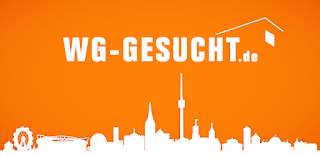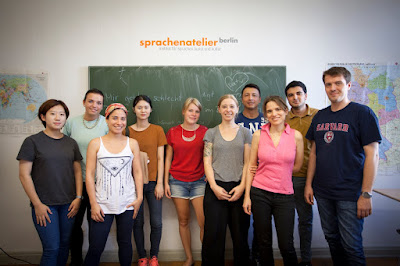Bilingual Berlin
For the German version, click here!
Last weekend, I decided to go for a
coffee. Take my book. Spend a couple of hours in a cute little café
chilling out. I ordered my drink, got myself cosied into the big
armchair that sat in the window, and was just about to start reading
my book against the gentle background hum of music and conversation
when after five minutes I realised something. I couldn't concentrate
on my book at all. Instead I found myself totally engrossed in the
conversations around me (something that doesn't happen too often here
with my level of German). A couple revealing their life stories as
they introduced themselves on a first date, some girls gossiping
around a laptop, and the painfully awkward exchanges between husband
and father-in-law, as the wife sat politely trying to make
conversation. There I was, sitting in a quiet little neighbourhood of
Berlin, and the only conversation I could hear was in English.
Of course, we all know that „everyone
speaks English“. This has been made very apparent to me in my first
month here in Berlin – some days I swear I hear more English being
spoken than German. And we all know that you can come to Berlin for a
weekend, for a week, for a year and get away with knowing barely any
German, if any at all. But does that mean we should take this
attitude?
As an English native speaker, each and
every one of my travelling or going abroad experiences has been
accompanied by the daunting question of what language is spoken in
the country. And this question is always answered with the classic
response „Ah, doesn't matter, does it? Everybody speaks English
anyway“. And in Berlin this is undeniably true. Almost all Germans
have varying levels of English. Some with just the basics, others,
particularly the younger generation, with English almost as good as
mine. They explain apologetically that they speak „only a little
English“ and then go on to tell you about their childhood, how they
feel about British politics and whether or not they think space
travel is a good idea. And all with perfect pronunciation of course.
It's demotivating, it's exhausting and
it's frustrating. But don't be disheartened my fellow language
learners. Berlin is a metropolis of different people, cultures and
languages, and it's not just about English. Some of the most spoken
languages in Berlin include Turkish, Russian, Polish, Arabic and
Kurdish to name but a few. In fact, English-speaking expats only make
up a very small proportion of the population in Berlin (Slow Travel Berlin). What does this mean? This means that you don't have to be
surrounded by English. The people you surround yourself with is very
much a decision that you make, and if you choose to spend your time
with English speaking natives then so be it. But if you want to
improve your Deutsch, and make that move from „outsider to local“,
you need to get involved. Ditch your compatriots and befriend some
locals. Persistence is key. Stick with your German. You might
frustrate a few baristas along the way, but don't give up. You just
need a little courage and some perseverance. It's in your hands!
Bonnie




Comments
Post a Comment